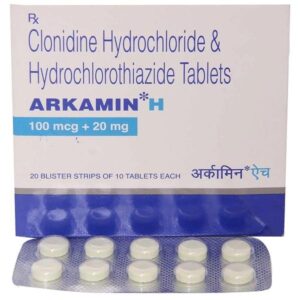CLONIDINE + HYDROCHLOROTHIAZIDE
Clonidine: Clonidine is a medication that belongs to a class of drugs known as alpha-2 adrenergic agonists. It is primarily used to treat high blood pressure (hypertension) but can also be used for other conditions such as attention deficit hyperactivity disorder (ADHD), opioid withdrawal, and anxiety disorders.
The mechanism of action of clonidine involves stimulating alpha-2 receptors in the brain, which results in decreased activity of the sympathetic nervous system. This, in turn, leads to a reduction in blood pressure by decreasing the amount of norepinephrine released by nerves and slowing down heart rate.
The dose of clonidine will depend on the condition being treated. For hypertension, the usual starting dose is 0.1 mg twice daily, which can be adjusted based on individual response. For ADHD, the dose range is typically higher, starting at 0.1 mg three times daily and increasing gradually. It is important to follow the prescribed dose and consult with a healthcare professional for proper dosing instructions.
Like any medication, clonidine can cause side effects. Common side effects include dry mouth, drowsiness, dizziness, constipation, and fatigue. These side effects are generally mild and tend to improve over time. However, more serious side effects can occur, such as low blood pressure, bradycardia (slow heart rate), and allergic reactions. It is important to seek medical attention if any severe or concerning side effects develop.
Clonidine may also have interactions with other medications, so it is important to inform your healthcare provider about all the drugs you are taking, including prescription, non-prescription, and herbal products.
Overall, clonidine is an effective medication for managing hypertension and other conditions, but its use should be closely monitored by a healthcare professional to ensure safety and optimal benefit.
Hydrochlorothiazide: Hydrochlorothiazide is a medication classified as a thiazide diuretic. It is commonly prescribed to treat high blood pressure (hypertension) and to reduce fluid retention (edema) caused by various conditions like congestive heart failure, kidney disorders, or liver disease.
The mechanism of action of Hydrochlorothiazide involves increasing urine production by inhibiting the reabsorption of sodium and chloride ions in the distal convoluted tubules of the kidneys. This promotes the excretion of water along with the ions, leading to a decrease in blood volume and subsequently lowering blood pressure. It also helps in reducing fluid buildup in the body by removing excess fluid.
The usual recommended dose of Hydrochlorothiazide for hypertension is 12.5 to 50 milligrams once daily, depending on the individual’s response. For edema, the dosage may vary and is usually determined by the healthcare provider based on the specific condition being treated.
Common side effects associated with Hydrochlorothiazide include frequent urination, dizziness, low blood pressure, electrolyte imbalances (such as low potassium or sodium levels), muscle weakness, increased blood sugar levels, photosensitivity, and skin rash. It is important to promptly report any severe side effects like allergic reactions, difficulty breathing, chest pain, or signs of dehydration such as extreme thirst, dry mouth, or confusion.
Hydrochlorothiazide may interact with other medications, so it is essential to inform the prescribing doctor about all current medications and medical conditions before using it. Regular monitoring of blood pressure and electrolyte levels is often necessary during treatment with this drug. It is vital to strictly follow the prescribed dosage and report any unusual symptoms or concerns to the healthcare provider.

